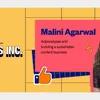How agencies are playing the ‘perfect matchmakers’ between brands and creators
At Yourstory’s Creators Inc Conference, industry experts break down the gaps between brands and creators and how agencies can play as the perfect catalysts to create win-win collaborations.
Generating brand stories and revenue via the voices of influencers and content creators, the demand for brand-friendly creators has increased significantly. In order to bridge the gap between the creators and brands, the need for exclusive talent representatives, managers and agencies came into existence. These representations help provide a competitive edge to creators, understand the demands of both creators and brands, and curate a win-win campaign.
While agencies play the perfect matchmakers between brands and content creators, it is time for them to go beyond making money and nurture talent as well.
“With creators, you have to work on branding, positioning and provide them a platform to grow. Besides that, you need to train and nurture them. Invest in budding creators because you never know who will blow up next,” said Sankalp Samant, Co-founder and Chief Growth .
Sankalp was a part of the panel discussion at YourStory’s inaugural edition of the Creators Inc. Conference.
Interestingly, he took a shot with one of the micro creators FinCocktail, a page dedicated to personal finance, and got a brand to collaborate with them. “When the content went live, FinCocktail went from 4,000 to 1,00,000 followers in a week’s time. The brand was extremely happy. The right content made the difference and gave exposure to creators. That is the role agencies play.”

Redefining measurement metrics
Likes and shares are important, but they are no more the sole criterion for measuring the impact and quality of an influencer/campaign.
“There is no industry benchmark scale to follow, it all depends on the brands, the problem they are facing, want to solve, and what is their desired outcome,” said Gunjan Arya, Chief Executive Officer (CEO) at .
A ‘desired outcome’ of every brand is different and higher sales could not be one of them. Some brands do sentiment analysis (conversation tracking—positive to negative) and see if they are able to change the sentiment of the brand when it goes to that influencer, while some measure the ad spend cost effectively and see if they are able to create a larger retargeting pool.
“Likes and shares are important because it influences the algorithms and drives higher reach and at the end of the day, that’s what marketing is.—how much did you get for how much money? But with reels and stories, you don’t have any engagement metrics. Here you are looking at the view through rate, how many saves did you get and so on. For all of this, brands need to work with creators directly and agencies can be catalysts,” she adds.
Avoiding legal tussles
Creators who have been in the space for sometime now, have the know-how of legal terms, contracts and other technicalities that they need to be concerned about. What about a new or an average creator, who does not have the knowledge, nor the tools and resources to protect their intellectual property? An agency has an important role to play here.
“It is our responsibility to train creators. On the other hand, we do not entertain long contracts (between brands and creators) with technical jargons. Creators who are not managed are sometimes pushed into signing binding contracts or are made to sign documents over reasons like clearance of invoices and all. We need to be more cautious,” said Aayush Tiwari, VP of Talent Management and Music Business at .
A piece of advice from Ayush to creators, who don’t have representation—reach out to lawyer friends or people around and have a general chat. A lot of things will get clear.
Leveraging data and analytics
Data analytics tools have led brands to realise that influencer marketing campaigns are much more than likes and impressions, and several other tools must be used to monitor the true figures of a campaign. Though a lot of free tools are available in the market, the problem comes when brands work on scale with a large number of influencers. That's where the analytical tools come to play for better discovery, end-to-end campaign management and analysing loopholes.
“Having a proper marketing technology practice or analytics tools not just helps you save costs but also understand if you are reaching the right audience. Face value is not enough. A Bengaluru-based blogger can have her major audience in Delhi. This won’t make sense for a local brand which is trying to reach out in the city. When you do this at scale, it becomes a bigger problem,” said Praanesh Bhuvaneswar, Co-founder and CEO, .
The entire influencer campaign can be automatically managed from the start to the finish without any manual intervention today. Campaign Response Prediction platforms, which are under development, will have the ability to allow a virtual content posting platform to work on its own.
Analytics can help you know what is happening behind the campaign as well. “With the help of data and analytics, Brands would come to know if it would be possible for them to reach the audience (probability), have predictive analysis, and see if the final outcome matches the predictability. This will help them fix the loopholes as well,” he adds.
Future trends: Emergence of micro influencers
Smaller or micro creators are here to stay. As stressed by the panel, smaller creators will be able to deliver a brand’s message in a much better way.
“We should stop seeing them as engines of advertisements but engines of amplification. That is where the agency's role comes in. Celebs influencers will not work in future. We (agencies) need to be more open to ideas and creativity as things will soon start getting saturated,” said Shubham Singhal, Co-founder at & .
Another major trend that the space is likely to see is ‘bigger influencers turning into a brand”, which will give rise to social commerce in a major way, he adds.
Brands and influencers can go beyond the pay-per-video/ pay-per-view model and work tighter to explore new synergies. This could be content licensing, content reselling, music video licensing, social commerce and much more. Influencers may tomorrow get into providing one-on-one consultancies to brands to help them reach a particular audience, adds Pranesh.
The panel concluded with a very important advice to creators— be humble and grounded.
Catch YourStory's Creators Inc conference here.
For more on other key initiatives as part of the conference, visit our Creators Inc. website here.
Recognising the burgeoning creator ecosystem and the new wave of entrepreneurship that comes with it, YourStory is celebrating the works of both established and emerging influencers in an initiative aimed at identifying, celebrating and accelerating the journey of digital creators who make extraordinary, unique and engaging content. We've partnered with Trell to bring you the Top 100 Creators challenge, which you can apply for here.
Edited by Ramarko Sengupta









